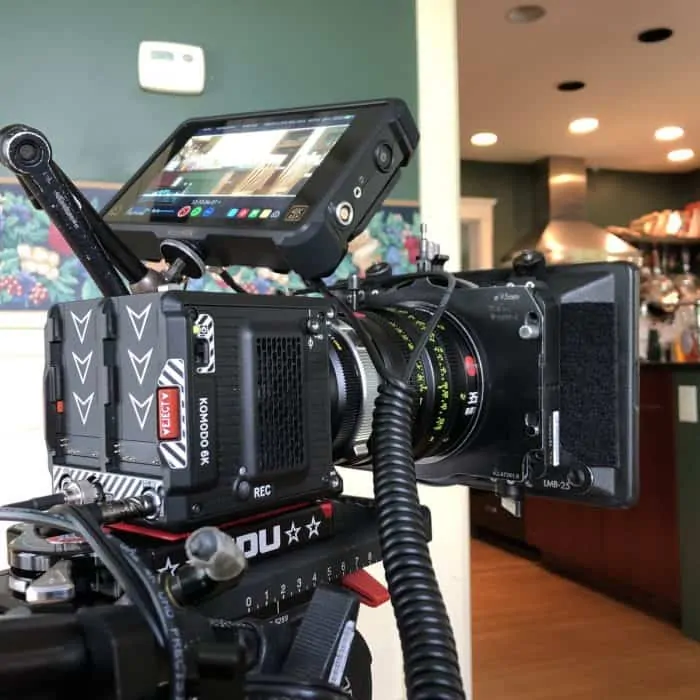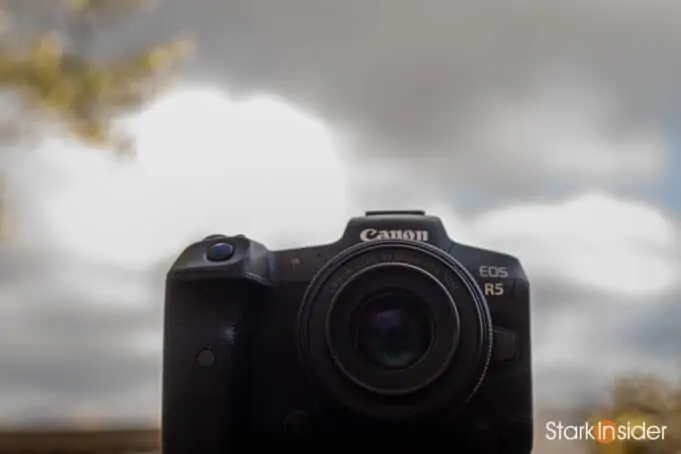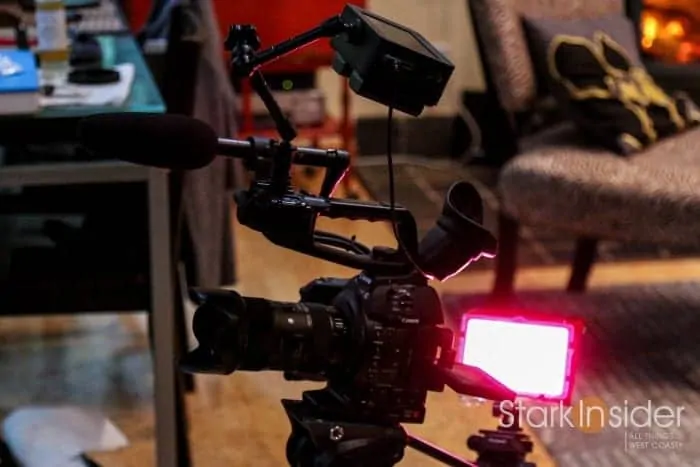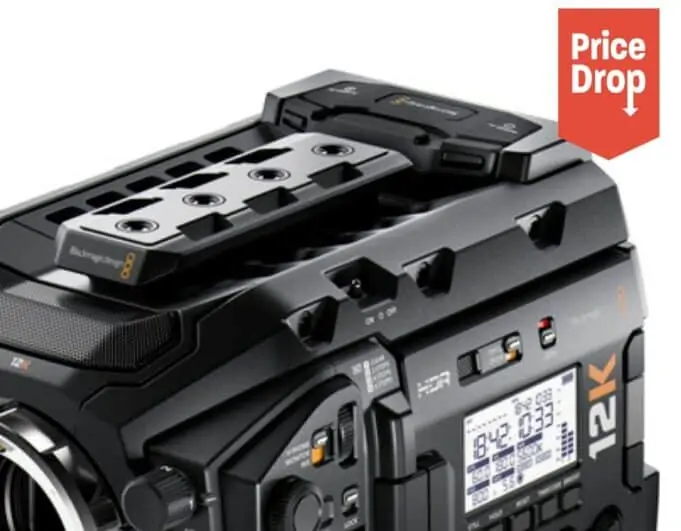Blackmagic Design has been making affordable gear for indie filmmakers ever since it introduced the much beloved Cinema Camera (BMCC) in 2012. A pocket version soon followed, before eventually the Australian company with a strong history of manufacturing professional audio-visual and broadcast products would jump on the resolution bandwagon. 4K became the norm, before even a 6K camera was released in the form of the Pocket Cinema Camera 6K.
And then came… 12K.
Yes, Blackmagic was the first, so far as I could tell at least in terms of a mainstream consumer product, to release a camera that could shoot at 12K resolution. 12K! Did we need it? I’m not so sure about that. But the industry seems to be chasing resolution — it does make for good marketing copy at least. And Blackmagic had beaten Sony, Canon, Panasonic, and even original 4K resolution innovator in RED Digital Cinema. Bragging rights indeed.
But the 12K camera, known as the URSA Mini Pro 12K, came with a price: $9,995 USD.
For those that needed the ability to punch in, or capture as much detail as possible that might’ve seemed like good value. However, the market seems to have spoken as Blackmagic this week dropped the price by a whopping 40%.
According to Newsshooter you can now buy a 12K for only $5,995.
Recall this is for a camera only released in 2020, so it’s been on the market for a little over a year.
Given the chip shortage when most tech products are going up in price this one is a bit of a head scratcher.
Here’s a couple of quick thoughts.
The Sub $10K Indie Cinema Camera Market is Hyper Competitive

Want to shoot a short film, documentary or maybe even an indie narrative for the film festival circuit?
You can always rent. But with so many sub $10K options, buying remains an interesting option; especially if you plan to use the camera body for multiple projects over several years. In which case, buying could make more economic sense.
In any case, as Newsshooter points out at the end of the article announcing the price cut, there’s some heavyweight competition in this segment, including offerings from Canon, Sony, and RED — all companies with broader and stronger name recognition than Blackmagic when it comes to television, and the film industry. Many of them are/were cheaper than the URSA Mini Pro 12K. For instance, you could buy a Canon EOS C70 for $5,499 or a Sony FX6 for $5,998. Sure, those two models only shoot 4K, but for most video projects that’s been proven to be absolutely more than enough.
And then you have the relatively new RED Komodo, a Redcode-shooting 6K camera with the new Canon RF mount with an appealing $5,996 price tag — a veritable bargain by RED’s pricey standards.
So I think in the context of the competition, Blackmagic is likely having a difficult time moving many 12K bodies for significantly more money. Perhaps this also demonstrates that the market is placing less emphasis on high resolution, and instead favoring things like better usability, higher frame rates, and companies with better name recognition (and reliability).
For most video shooters, including indie filmmakers, and those creating music videos and fashion films among this group I’d be hard pressed to pass up the RED Komodo and its well-established and high performance RAW Redcode workflow.
At the Macro Level, the Cinema Camera Market is Shrinking

Like the interchangeable lens camera body market (DSLR and mirrorless) that is slowly succumbing to the ever advancing smartphone camera, I think we’re also seeing the cinema camera market shrink in overall size.
So this is not a uniquely Blackmagic problem. Rather, the camera market is evolving. And there’s plenty of short term pain for many of the players we’ve grown to appreciate over the years, including companies such as the aforementioned Canon, Sony, Panasonic and RED.
Most of the camera market reports are behind (expensive) pay walls so I’m not privy to that information. From what I can glean from occasional reports out of Japan or from various analysts, however, we’ve seen decreasing sales and growth for the past few years. Not much surprise. Apple is spending a mint in R&D and marketing in building up its iPhone’s cinematic skills. I think to date CEO Tim Cook has been quite successful in establishing it as a viable option on certain productions.
A recent report (again, behind a pay wall) forecasts the global camera accessories market will slow at a CAGR of 5% over the next four years. Just a data point, to be sure, but one that reveals less demand in an adjacent category.
Anecdotally I’ve noticed sizeable drop-offs in camera user forums including activity and posts on sites such as REDuser and DVXuser. Gone are the days of thread after thread of excitement about a new model. Or users sharing their work. Still there could be another reason which brings me to my next point.
Then There’s the Pandemic…
To make matters worse we are, of course, living under COVID. While Hollywood, Netflix, Amazon and HBO, among others, continue to pump out content I think things have been tougher further down the line.
Weddings have been postponed, time and time again. And that’s a massive segment for camera makers.
Small indie film projects have been likewise delayed or cancelled entirely.
If shooting in the best of times is challenging for most of us already, adding on the cost of dealing with safety precautions due to the pandemic and bolstering sets with additive measures means one thing: higher costs. Further, when everything takes more time budgets need to go up. This phenomena, in my estimation, at least temporarily prices out the smaller productions. Only the well-healed studios can weather the storm so to speak.
Where to Next?

A Blackmagic price drop is but one data point. Yes. Still, place it alongside a series of events over the past two or three years and it’s not hard to see that the cinema camera market is going through a shake up. Camera performance that used to cost tens of thousands of dollars can be had for far less. Plus there’s almost no sacrifice in features or performance. The catch? I don’t think there is one. Technology is getting better, and sensors are giving us everything we need — creativity and execution are truly the hurdles of our time.
With that I predict consolidation.
Ultimately the pie is not big enough for all the players to survive long term.
Another prediction and a trend likely to continue, and one that flies orthogonally to the dramatic Blackmagic price drop: we will actually see continued moves up-market by the establishment (Canon, Sony, Panasonic, Nikon).
Hence: full-frame.
Why all the high frame models these days? Because there’s a perceived value among buyers that full-frame is better than Super 35. That’s wrong in my view — or, at best, misconstrued. But marketers have done a good job selling the full-frame fantasy. So they can charge more, since full-frame sensors are bigger and more lust-worthy. Granted this is a smart move, as it edges the camera manufacturers up the price chain, away from the encroaching ~ $1,200 cinema smartphone and its computational photography jujitsu.
One more parting thought.
Could we possibly see some creative, out-of-the-box licensing deals emerge?
Companies like Apple and RED could possibly license their technology for others to use. Or maybe, some how, some way, the likes of Canon and Sony could in turn license from Apple the ability to embed an iPhone as the “brain” into a camera body. That way you’d get the best-in-class software features that the iPhone brings together with the tried-and-true body of a mirrorless camera, what with its interchangeable lens options, long battery life and flexible storage options. A bit of a wild scenario I agree. Even silly. But something needs to give lest the market eventually bifurcate entirely: cinema smartphone at the entry level, and dedicated cinema camera (Arri, RED) at the high end.
As the industry returns post-pandemic I do know this: we’re a spoiled lot. Hugely capable cinema cameras have never been more affordable. Now the onus is on us to get out there and execute.
Oh: one last thing.
Remember the saying, “date your camera, marry your lenses”? Something to keep in mind. You could get burned on resale as technology quickly evolves.


